- Home
- M. D. Lachlan
Wolfsangel Page 6
Wolfsangel Read online
Page 6
Authun breathed in. Would the Valkyries find him down here, he wondered, to take him to Valhalla to feast for ever? Or would it be just that damp dark, always. He reached to his side. Then he realised the cords on his belt were loose and the children were gone.
A guttering flame burned the king’s eyes and he moved to shield them. In a glimpse he saw, leaning over Saitada and the babies, a tiny old woman in a white shift. Above her, in a flicker of gold, almost like a flame herself in that light, stood the witch queen, that grim child, pale and beautiful, crowned in an impossible tangle of golden cables, rubies, emeralds, diamonds and sapphires, like a dragon’s hoard in miniature.
At her throat was a rich necklace whose jewels burned with a light familiar to Authun. It was the light he’d seen as he sacked the five towns, the light of the burning village from which he’d taken the child, the light of destruction. Then it was gone, and he could see nothing.
A baby was thrust into Authun’s hands. Then some sort of object. It was a small leather bottle, half full with liquid, he could feel. No one spoke, though he understood what it was - medicine to give his wife, to complete the deception.
‘The mother will come with me?’ said the king.
‘Who?’ The older woman’s idiot hoot again.
Authun must have been dreaming because all around him tiny lights came on and went out, the faces of the strange sisters appearing for an instant and then vanishing again. Wherever they were, it seemed, was wreathed in gold - arms and armour, cups and plates, fine arm rings and gilded chests of coins. The king used the light to locate his sword. His hand closed on it and he had to will the tension from his fingers. If he was going to fight he would need to be relaxed: too tight a grip would rob him of speed.
‘The mother?’
‘Who?’
Authun was finding his ordeal almost unbearable. He longed for the real light, for the feel of the breeze and the taste of rain. And then it was dark again and he didn’t know for how long.
He awoke by the bank of a river. The Moonsword was gone but the baby was at his side. He was terribly thirsty and plunged his head into the water and drank like a dog. Then he turned to the child. It was filthy but looked well enough. It was crying, at least, which Authun took for a sign of health. He looked at the Troll Wall, far in the distance, still immense. He washed the child and thought of all the sorrow that had surrounded it up until that point, the deaths and the deception that had brought them to where they were. Even the death of the bandits played on his mind. There were his kinsmen left on the river beach; Varrin, weighed down by the byrnie, swallowed by the sea; that poor girl with her hideous face - what had become of her? At the very best she had lost one of her babies. At the worst? Still alive and alone in that awful dark for as long as it took for thirst to kill her. On any other day of his life Authun would have regarded these things as simply the way of fate, unpleasant briars he’d had to pick through to get to the clear path ahead. But though he didn’t know her name, he thought of Saitada and, alone by the water, Authun the Pitiless wept.
Then he wrapped the child in his cloak and headed for the cabin, five days away at a comfortable pace, where his wife lay supposedly pregnant. He looked at the baby. It needed a wet nurse and wouldn’t last that long. He would need to do the journey in much less than that. Never mind. After the stagnant air of the cave it would be good to feel the exhaustion of movement. By the water’s edge on his way he saw hoof prints, maybe two riders. He only had his knife, but if he could kill a horseman then he could be at the cabin in perhaps a couple of days, maybe less if he could get a second horse. More deaths would be needed before he reached his homeland.
6 Wolfsangel
Had Authun been of a more reflective nature, he might have wondered why the witches had been so generous as to grant him the son he longed for. He would have suspected unasked-for generosity in any rival king and expected it as a right from a visiting ambassador, but the witches belonged to another realm entirely. They were in the sphere of the supernatural, the unguessable, similar to providence or fate, and he didn’t question their gift any more than he would have a whale beaching on his shores, or a good wind for his longships on a raid.
It would have surprised him to learn that the witches were acting from something as mundane as fear.
Though the women of the Troll Wall were considered monsters by the people and kings from whom they took their tribute, they were really not so very different to the terrified farmers, jarls and thralls who left their gifts of food, drink and children on the mountainside.
The fisherman who had lost his boy, for instance, thought of the witches as monsters. He couldn’t say if he had been waking or dreaming that midnight when the air in his house had seemed as tight and cold as a compress on his skin and the thing he had glimpsed from the side of his eye vanished when he turned to look at it properly. The lad had woken in the morning and said the women had called to him, so the fisherman had taken him to the mountain. There was no other way, he knew. The consequences of refusal would be visited on all his people, not just his own family.
The man had watched trembling as his son walked away and was swallowed by the fog. He couldn’t have imagined that the witches felt anything at all, least of all fear. But the women were afraid.
What is prophecy? It is a wide thing of many forms. We don’t call a person who anticipates a cat will knock over a cup and moves to catch it a prophet. We don’t maintain that the ability to look at the clouds and say it will rain makes you a seer. Even in the summer we know the cold of winter will come, but no one claims magic powers for that. These predictions are part of our everyday experience of the future, not a veiled and mysterious thing but something that connects directly to the present.
In the crags and caves of the Troll Wall, behind that door in the face of the cliff that you would not see, could not see, if you were not invited there, the witch queen’s powers of prophecy were not unrelated to those possessed by us all. The boundaries between the present and the future are not as strong as we imagine, and the witch queen had sweated, frozen, starved and hallucinated until hers were not strong at all.
Prophecies were not something external to her, something she made or said; they were part of her consciousness, the way she saw the world. They were like a language she spoke. And for a year before the queen had sent Authun on his mission, that language had hissed softly of a threat. It did not arrive wholly formed one day, but rather started like a suspicion or even a rumour - a whisper beneath the rush of the cave streams or a cold that crept too far into the earth and left her shivering even in the wolf chamber, where the breath of a fettered god heated the rock so it was painful to touch.
The feeling grew in her as she sat in the dark, and it grew in the other sisters. As the witches eroded the distinction between today and tomorrow, they blurred the lines between me, you, she and it. Their experiences were like possessions that could be lent, borrowed or shared.
Minor magics were used to clarify the sense of foreboding. The sisters lit a whale-blubber candle and asked it for a vision. They could have asked anything to direct them but they chose the candle because it had once been a living thing and so its connections to the outside world were more solid than those of the rocks of the caves. First the candle revealed its past, as it would to anyone, the fish stink filling the cave. The sisters, though, could sense more. They breathed in the stress that had seeped into the fat with the whale’s beaching, its discovery by hunters and its killing. The candle burned on, and they began to see that, for the prophecy, the quality of its light was the important thing.
Then a sister, because it felt right, reached forward and snuffed out the flame. The light disappeared but the thought of the light, its residue, filled the witches’ minds. Underneath the sickly yellow of the flame, they thought, was a darker colour, a bright slate, the colour of the sky before a storm. The link was followed, and rainwater was brought down in a cup from the top of the Wall, and it was noticed
that the water felt heavier than normal water, or rather it held a sentiment, a wish. The water, thought the sisters, still wanted to fall, to be rain again. The smell of it too was sharp, like ozone. The link to the coming storm seemed stronger.
A witch went to the top of the Wall to observe the birds. They had moved from the north face of the mountain and come around to the south. In the valley, she could sense, other animals were moving to shelter. The gulls had come inland and insects were burrowing into the earth. Why were these things happening? Because the witches were looking. The animals didn’t move to offer auguries to the ordinary people of the mountains.
The portent was clear then - a storm, a magical storm. In the winter the message became clearer. The smoke on the wind bore the scent of funeral fires; the rats that ran through the caves seemed to carry an excitement and an expectation; more ravens than gulls were seen in the sky; a vision of the hangman’s tree seemed to resonate in the witches’ minds, day and night, the creaking of the rope waking them from their dreams, intruding on rituals where it had no place. Death was all around them, they knew, waiting for its moment to touch them. The time for subtlety was over.
A rune would need to be carved. The ordinary people knew runes, scratched symbols that allowed them to record simple messages or list things. But to the witches they were much more than that, more even than charms for amulets or to guard a chest, as some of the healers and wise women of the farmsteads knew them to be. They were living things that took root in the mind and grew within it, changing it utterly, feeding on sanity and blossoming into magic.
Rune carving was not something the witches took lightly. Runes were powerful sources of magic given by Odin - or rather taken in pain and anguish and wilful madness from the dark god by the earliest women who had retreated to the mountain.
Generations before, there had been just one witch. She had sat alone in the caves, her mind falling through the dark, until her pain had matched the dead lord’s when he hung on the tree for nine days and nights pierced by the spear and chilled by the moon at the well of wisdom. Her reward was a rune that meant daylight and, though it had no name, it shone in her mind and warmed her bones like the sun on a summer’s afternoon. The presence of the rune inside her gave her the power to heal the people of the mountain and the ability to reveal glimpses of the future to them. In return, they had sent her three girls to train.
One of them, drowned, starved and frozen for year after year, met the dead god by the deep pool and was given a rune that sparkled like bright water. The minds of men fell open to her and she began to dream the dreams of children in faraway places, hear jealous whispers flowing through the mountain passes and feel the coursing currents of love and hate that washed over the farmsteads.
Another took a different path to knowledge. She dug her own grave and the sisters sealed her in with a rock. As her sanity collapsed she had felt the god lying next to her in that tiny space, touched the rope at the god’s neck and felt his body cold and lifeless next to her. Her rune seemed to grow and wither in her mind, now obscured by earth and weeds, now exhumed and vibrant. When she was lifted from the ground she was scarcely breathing, but she had won the most valuable rune of all. Now she knew the secrets of inheritance and how magic can be given as a gift.
From that moment on, death could not take the power of the runes from the sisters. Each could build on the knowledge of her teachers. Progress was possible. The witches grew more powerful, generation after generation keeping what they had and building on their knowledge until there were twenty-four sisters of the inner circle, each the guardian, nurturer and expression of a different rune.
Now, though, there was a twentyfifth witch. She was known to Authun as Gullveig, the witch queen, and to some of the local people as Huldra, but the sisters never called her that, or anything. She had been brought to the tunnels as a baby, destined - according to divination - to take on the rune of daylight. But when the witches started to work with the girl it became plain it was already within her, seeming to shine from the darkness from her first meditations, to rustle like the wind in a full-leafed tree in the minds of all the witches who looked at her. This was a puzzle for the sisters because it normally took years of suffering and denial to make the rune manifest - that and the death of the sister within whom it currently dwelled. At two years old the girl was put to further agonies and observed. A rune seemed to spill from her - silver like the sea on a moonlit night - then another, which twinkled like ice in the morning sun, and then a third, which seemed more a feeling than a vision, harsh prickles on the skin with a deep, blustery cold, and a fourth, with the scent of wild fruit, a fifth, like hunger, a sixth with the glint of gold, a seventh that smelled of roses and blood, and an eighth with the sound of the wind in sails. By the end of the girl’s third year all the twenty-four runes that the sisters spent their lives expressing, dreaming and using for their power were in the girl.
She represented a new stage in the witches’ evolution. Previously the queen had only held the daylight rune, that of the first witch. Gullveig had them all. Through her early years her ritual sufferings had propelled her mind on travels with the hanged god through dry tombs in arid lands where the dead seemed to claw at her from their crumbling graves, to mires and peat bogs where she had seen the fresh pink skin of the newly drowned whose faces seemed to implore her for help her as they sank, to battles where she heard the whispered names of lovers and children on the lips of dying men and where she picked the shrieking runes from their fingers. It was said she was mad, but had the farmers and warriors of the valleys known what she had been through, they would have marvelled she stayed so sane.
Reading the portents of rock, wind and water, Gullveig knew something extraordinary was happening. The foreboding that filled the caves, the heavy air, the sense of frustration waiting to break, told her she had no choice. She had to carve a rune, to force the future into the physical realm, to make it something that could be handled, discussed and, ultimately, manipulated.
For this she descended to the lower caves, where the rocks were stained glowing reds and greens and the damp and the cold gave way to a heat that seemed to pour from the earth. She took with her a small piece of cured leather that had once been a chieftain’s belt and a pin that had held his cloak at his neck. Then she stayed on her own for a season. No one brought her food; the water she had was only what she licked from the cave walls; there was no light except the phosphorescence of the rock and no presence but her own. At the end of her ordeal the sisters came and carried her from the cave. She had written nothing and it was clear a greater trial was needed.
The sink hole at the bottom of the ghost caves was not a natural phenomenon, though no one could recall who had dug it. It was about an armspan wide at the top but narrowed as it descended ten or twelve times the height of a man until anyone falling into it would have been stuck fast like a stopper in a bottle. The shaft cut across a powerful underground stream which entered through a fissure as wide as an fist at the top and left through another at the bottom. The result was that, when the witch was lowered by rope into the hole, she was immersed in flowing water up to her neck.
She knew that, for the ritual to succeed, she would need to spend nine days there.
The first three days had been dark and agonising. She was, after all, human. No one who had grown up without her training could have endured it. Since she was a tiny girl she had been subjected to terrible long fasts and meditations, she had consumed strange mushrooms and been confined and buried like the dead, spent nights naked beneath the moon on frozen hillsides when only the power of the mind stands between life and death. So the witch queen did endure it, clawing her way out of her humanity in pain and anguish. On the fourth day the torture had divorced her mind from her physical body and the lights had come on. Dwarfs stood in the darkness, offering her gold and jewels and a ship that seemed built of something like pearl but was, she knew, made of dead men’s nails. It was all hers, if only she would call
to the sisters to pull her from the water. On the fifth day the walls around her flamed with green and purple lights and the spirits of the rock tried to lift her from the pool, but she remained. On the sixth day her ancestors were at her side, the ghosts who gave the caves their name, one hundred queens all less powerful than her but all part of her. She was the sum of the whole, she knew. All the dead queens were there, some naked and smeared in muds and vegetable dyes, some finer than she was, calling, jabbering, singing and weeping in the dark. They begged her to give up, spat at her, tried to rip her from the water, but she would not relent. The witch queen was on the way to her answer. On the seventh day there were voices and she knew the gods were near. On the eighth day there was just blackness, an absence of thought, nothing, as she stood on the edge of death. Then, on the ninth day, she was back in the pool, just as she had been the moment she went in.
The flowing water had stopped and she felt warm. None of the other sisters was around her, nor any of the servant boys, but the phosphorescence of the rocks seemed even brighter. In the cave it was like daylight.
A voice came echoing from tunnels that stretched away from her.
‘Do you know what they did to me? Do you know what they did?’ Though the witch queen rarely spoke, she could understand these words that resonated as much in her mind as in her ears.

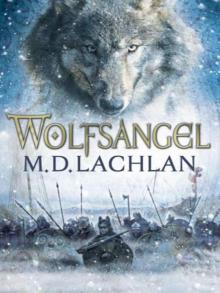 Wolfsangel
Wolfsangel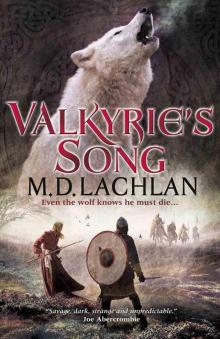 Valkyrie's Song
Valkyrie's Song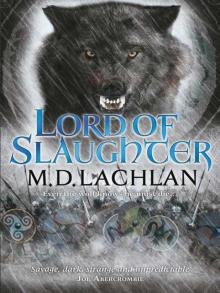 Lord of Slaughter
Lord of Slaughter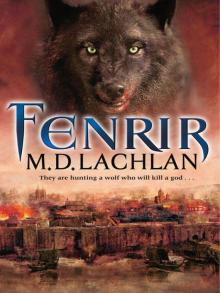 Fenrir c-2
Fenrir c-2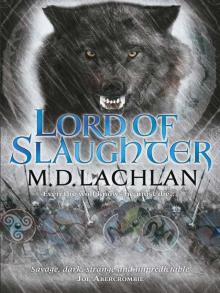 Lord of Slaughter (Claw Trilogy 3)
Lord of Slaughter (Claw Trilogy 3)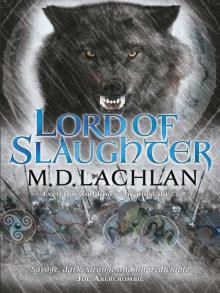 Lord of Slaughter c-3
Lord of Slaughter c-3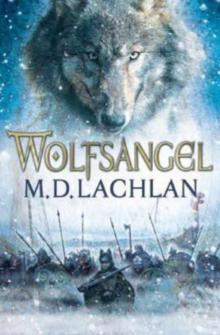 Wolfsangel c-1
Wolfsangel c-1